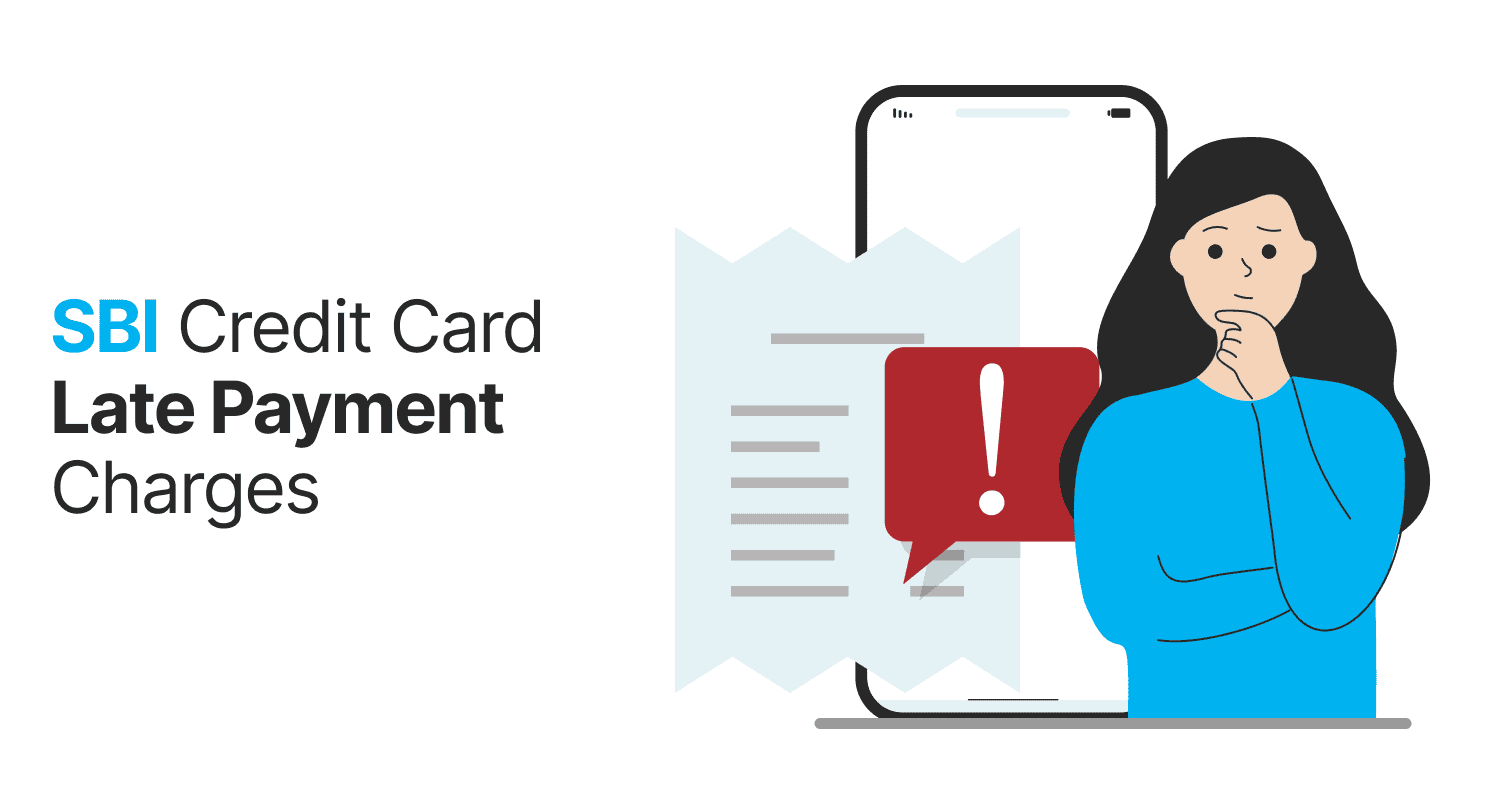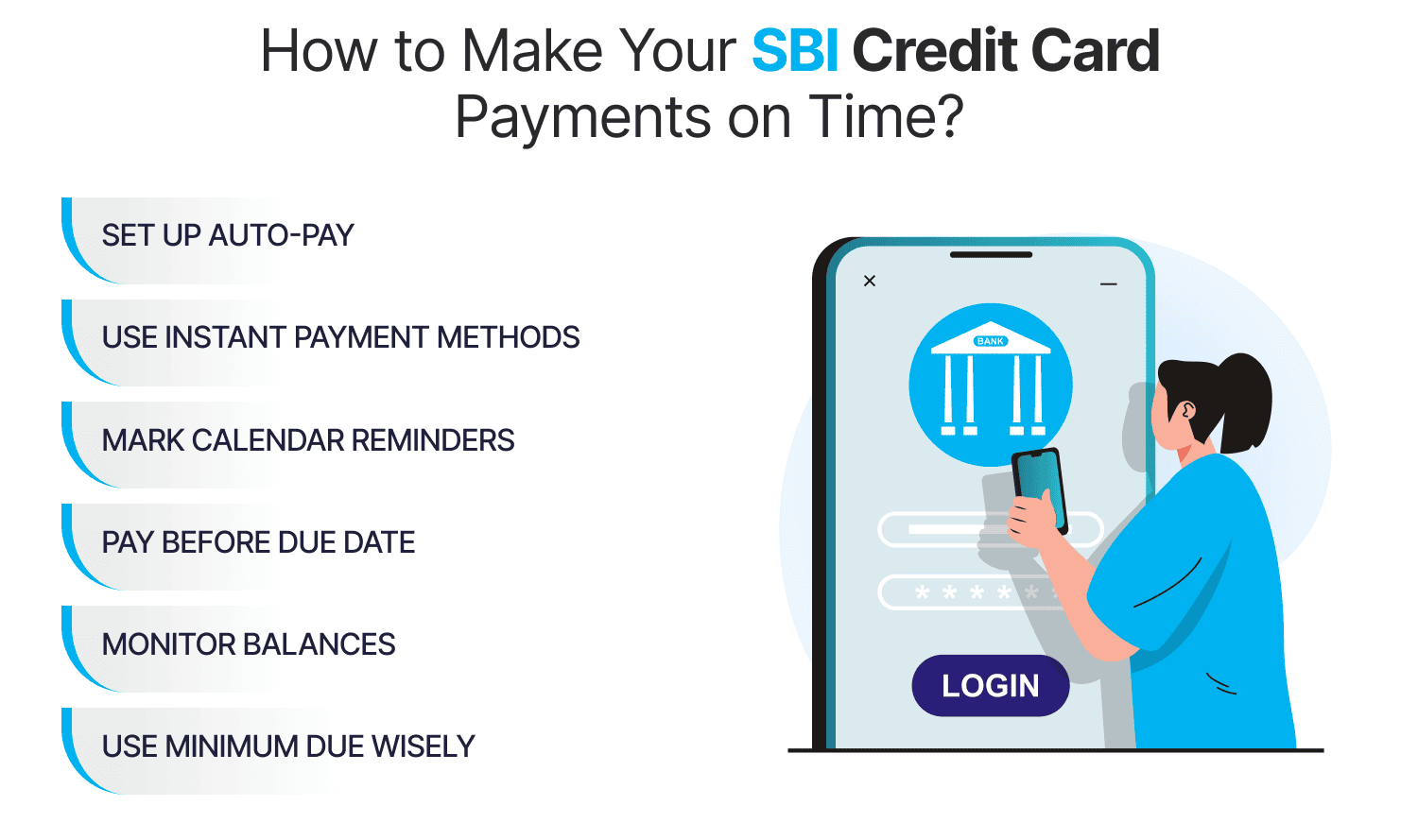SBI Credit Card Late Payment Charges

Last Updated : June 12, 2025, 1:19 p.m.
SBI Card is among India’s largest credit card issuers. SBI bank will levy SBI credit card late payment charges according to its fee schedule if you do not make the payment of the minimum amount due by the due date. In 2025, these charges are in accordance with RBI’s guidelines on credit card fees. RBI mandates a 3-day grace period after the due date, so payments made within three days generally avoid any late fee. Understanding SBI’s exact fee slabs and related charges is crucial for SBI credit card users to avoid unnecessary costs and protect their CIBIL score .
These slab-based fees apply for each billing cycle that you fail to pay the Minimum amount due. In addition, SBI Card imposes an extra ₹100 penalty if the minimum due is missed for two consecutive billing cycles. This ₹100 charge recurs every cycle until you clear at least the minimum dues. (For example, if you skip two billing cycles, you’ll pay the regular late fee plus an additional ₹100 on each of those statements.)
Key point: Late fees are flat penalties based on the overdue amount. They are not interest, but a penalty for missed payments. (Interest/finance charges are separate and apply on unpaid balances.) By paying at least the MAD on time, you avoid these late fees entirely.
When are SBI credit card late fees charged?
RBI regulations (effective March 2024) require credit card issuers to grant a 3-day buffer after the due date. The bank will only charge SBI credit card late payment charges if the account remains unpaid for more than three days past the due date. In practice, this means:
- If your statement due date is May 10, paying by May 13 (inclusive) typically means no late fee is applied.
- A late fee is levied only if payment is still pending on the 4th day (May 14 or later). The penalty then appears on your next billing statement.
- The late fee (and any finance charges) is added to the following cycle’s bill. RBI also clarifies that penal fees are charged only on the outstanding amount after the due date, not on the entire original bill.
In summary, SBI Cards will levy late fees once you exceed the 3-day grace period without making the payment of the minimum amount due. It is advisable to always clear dues before the due date or within the grace days to avoid these penalties.
SBI Credit Card Late Payment Charges 2026
| Total Outstanding Amount (₹) | Late Payment Charges (₹) |
|---|---|
Less than ₹500 | NIL |
₹500 – ₹1,000 | ₹400 |
₹1,001 – ₹10,000 | ₹750 |
₹10,001 – ₹25,000 | ₹950 |
₹25,001 – ₹50,000 | ₹1,100 |
Above ₹50,000 | ₹1,300 |
SBI Credit Card Withdrawal Charges
Withdrawing cash using your SBI credit card (domestically or internationally) accrues a cash advance fee. SBI Card’s cash withdrawal charges are:
- 2.5% of the amount withdrawn (or Rs. 500, whichever is higher)
For example, a Rs. 10,000 ATM withdrawal attracts a fee of Rs. 500 (Since 2.5% of Rs. 10,000 = ₹250, which is lower than Rs. 500). A larger Rs. 22,000 withdrawal costs 2.5% (₹550), which is more than ₹500, so the fee is ₹550. Note that SBI also charges finance (interest) on the cash advance starting the day of withdrawal, because cash advances do not enjoy any interest-free period. Always use cash withdrawals sparingly due to these high fees and instant interest.
SBI Credit Card Forex Markup Fees
For transactions in foreign currency (overseas spend or international online shopping), SBI Card applies a forex markup fee. The current forex fees are
- 1.99% of the transaction amount – applicable to premium SBI cards (SBI Card ELITE and SBI Aurum).
- 3.5% of the transaction amount – applicable to all other SBI credit cards
For example, if you use a regular SBI Card abroad for ₹10,000 worth of foreign currency, you’ll pay an additional ₹350 as forex markup. On the SBI ELITE/Aurum cards, the same spend would incur just ₹199 markup. (The Aurum card is an invite-only premium card.) These charges are automatically added to your bill in INR after currency conversion.
Other SBI credit card Fees
Apart from late fees, SBI credit cards have several other charges and penalties. The table below shows these other fees
| Fee Type | Charge |
|---|---|
Over-limit Fee | ₹600 or 2.5% of the over-limit amount (Whichever is larger) |
Payment Dishonour (Bounce) Fee | 2% of payment amount or Rs. 500 (Whichever is higher) |
Cash Payment at SBI Branch | ₹250 + taxes |
Card Replacement Fee | ₹100–₹250 (₹1,500 for SBI Aurum) |
Add-on Card Issuance | Nil (free) |
Minimum Finance Charge | ₹25 |
Rewards Redemption Fee | ₹99 (per redemption request) |
Rent Payment Transaction Fee | ₹199 per transaction (via SBI Card’s online rent platform) |
Note: Always review SBI’s fee schedule (MITC) for your specific card variant to avoid surprises.
What happens if you keep missing SBI card payments?
Continuously missing SBI credit card payments has serious consequences. First, SBI Card will keep adding SBI credit card late payment charges for each billing cycle, plus interest on the unpaid balance. In fact, after two missed cycles you’ll incur the extra ₹100 penalty each cycle. Crucially, your interest-free period on new purchases is lost until the full outstanding is paid, so any fresh transactions will start accruing interest immediately.
If payments are not made even after a few days overdue, SBI (like all banks) must follow RBI rules before reporting you as a defaulter. RBI permits reporting to credit bureaus only when an account is “past due” by more than three days. If you still do not pay, your account will be marked as a default in your credit report. Your CIBIL score will take a huge hit and remain lower for years. Further, SBI may eventually block the card or take recovery action on the unpaid amount.
In short, repeated missed payments mean more fees and interest piling up, loss of privileges (like losing your interest-free credit period), and serious damage to your creditworthiness.
How to Make Your SBI Credit Card Payments on Time?
The best way to avoid SBI credit card late payment charges is to pay your SBI credit card bill on time (preferably in full). Here are some tips:

- Set up auto-pay: Use SBI Card’s NACH/auto-debit facility or UPI mandate to automatically pay at least the Minimum Amount Due each month. This ensures on-time payment even if you forget.
- Use instant payment methods: Make payments via SBI YONO app, SBI net banking, UPI apps, IMPS/NEFT, or SBI ATM/debit card. These methods post to your account instantly (same day), ensuring timely credit.
- Mark calendar reminders: Note your statement due date in your calendar or finance app. Set multiple alerts some days prior to the due date.
- Make the payment prior to the due date: Always wait for the processing time. For example, bank holidays or non-instant channels (like cheque or online bill pay) can take 2–4 days. If using slower methods (NEFT, cheque drop box), pay a few days early.
- Monitor balances: Check your SBI card balance regularly. If you have multiple cards, consolidate reminders to avoid missing any.
- Use minimum due strategically: If cash is tight, at least pay the full Minimum Amount Due by the deadline to avoid late fees (though carrying a balance will incur interest)
By leveraging SBI’s payment channels and RBI’s 3-day rule, you can easily avoid late fees. For instance, if your due date is July 10, paying by July 13 (three-day buffer) means no penalty. Always verify the payment confirmation (most apps send SMS/notifications) so you’re sure the bill is paid.
How Do Late SBI Credit Card Payments Affect Your CIBIL Score?
Your CIBIL score heavily depends on your credit repayment behavior, with payment history being one of the most influential components. Even a single defaulted or delayed SBI credit card payment can reduce your score significantly. If your SBI credit card bill remains unpaid for over 30 days past the due date, the account is considered delinquent. At this stage, the bank may report the delay to credit bureaus like CIBIL, marking the payment as “late.” A 30-day delay can cause a noticeable drop in your credit score, as payment history contributes nearly 35% to your CIBIL score calculation. Once reported, such negative remarks can stay on your credit report for up to seven years, making it harder to qualify for loans or new credit cards in the future.
Defaults or chronic delays are red flags for lenders, indicating higher risk. However, SBI Cards usually provide a short grace period of 2–3 days, during which the payment might not be reported if made promptly. To maintain a healthy credit profile, ensure you pay at least the minimum due on or before the due date each month. Consistently making on-time SBI credit card payments not only avoids late fees but also helps preserve or improve your CIBIL score—boosting your eligibility for better interest rates, loan approvals, and top credit card offers. In short, timely repayments are key. Delay or default, and you risk more than just a penalty—you put your creditworthiness on the line.
Conclusion
SBI credit card late payment charges in 2025 are clearly defined: up to ₹500 overdue incurs no fee, and fees escalate to ₹1,300 for large unpaid balances. RBI’s recent regulations (effective 2024) ensure a 3-day grace period and stipulate that penalties apply only on the outstanding amount. Other SBI Card fees (cash withdrawal, forex, overlimit, etc.) should be noted too. The best strategy is to use SBI’s multiple payment options (UPI, YONO, auto-debit) to clear your bill before the due date. Timely payment not only saves you from fees and interest, but also protects your CIBIL score from negative hits. By staying informed of these charges and following simple payment tips, you can manage your SBI credit card cost-effectively and maintain good credit health.
Disclaimer: The charges given above are as of when this page was written. To ensure accuracy, always refer to SBI Card site for the latest fee schedule.
Frequently Asked Questions (FAQs)